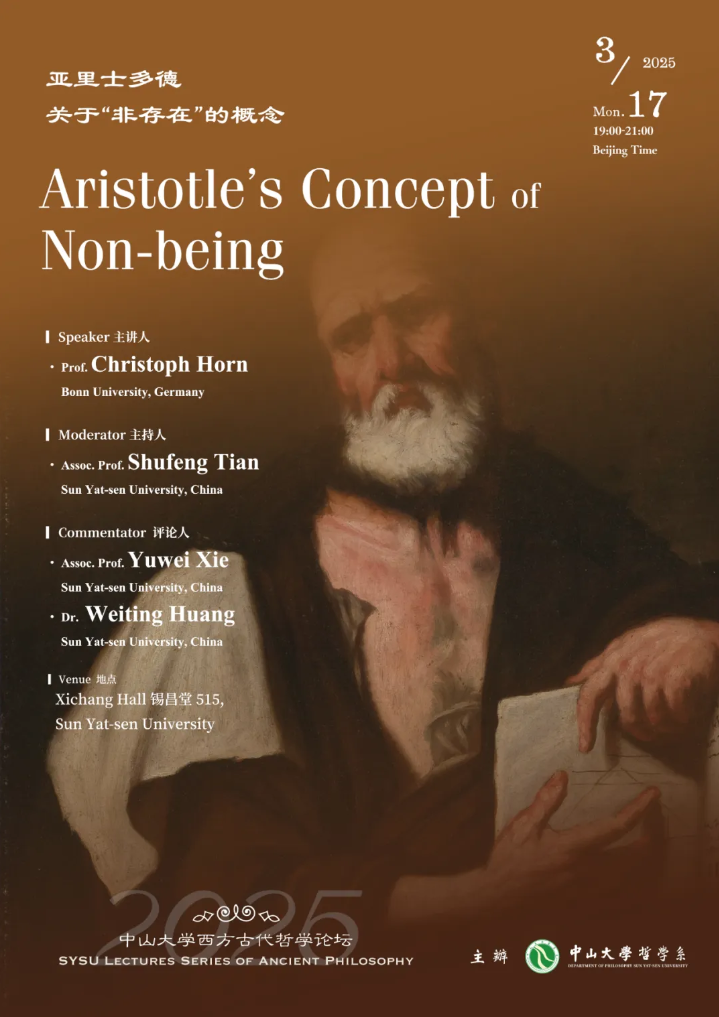中山大学西方古代哲学论坛预告|Christoph Horn:亚里士多德关于“非存在”的概念
亚里士多德关于“非存在”的概念

亚里士多德关于“非存在”的概念
Aristotle’s Concept of Non-being
Speaker:Prof. Christoph Horn
Bonn University, Germany
Moderator:Assoc. Prof. Shufeng Tian
Sun Yat-sen University, China
Commentator:Assoc. Prof. Yuwei Xie
Dr. Weiting Huang
Sun Yat-sen University, China
Time:Mar. 17, 19:00–21:00 (Beijing Time)
Venue:Xichang Hall 锡昌堂 515
主讲人简介
霍恩教授(Prof. Dr. Christoph Horn)是德国波恩大学哲学系“实践哲学和古典哲学”教席的讲席教授。在古典哲学研究方面,其重点为柏拉图、亚里士多德和奥古斯丁的哲学。他是德国百年来不断更新的“宇博威格哲学史”古代哲学史系列的主要作者之一,也是“亚里士多德德语全集”《形而上学》Lambda卷的翻译者和评注者。在实践哲学研究方面,霍恩教授注重从德国古典哲学的康德道德理论出发,与当代前沿的行动理论结合。
内容简介
Non-being or negative ontology is an important topic in ancient philosophy and yet a widely neglected one in academic scholarship. So far, there exist almost no comprehensive publications on this subject. The fundamental philosophical difficulty with non-being was first highlighted by Parmenides: it is principally impossible, he believes, to speak or think of a non-being; and insofar as we are doing this nevertheless, our speech and thought is misleading. Many philosophers after Parmenides have been deeply impressed by this argument and seriously dealt with the following question: Is the Parmenidean line of thought inescapable? If not, in which sense can we, despite Parmenides, nevertheless think or speak of non-being? Can we avoid speaking of the non-being? And in which way can we have knowledge of non-being? The enigma of non-being has been discussed in antiquity until the end of ancient thought in late Neoplatonism. Roughly speaking, we find the following six notions of non-being:
(1)non-being as something impossible, unthinkable, and inconceivable (nihil negationis);
(2)non-being as radical emptiness, as the ‘void’ (nihil vacui);
(3)non-being as otherness (nihil alteritatis);
(4)non-being as a reduction, a lack or a shortage (nihil privationis);
(5)non-being as a quasi-entity (nihil figmenti);
(6)non-being as superabundance (nihil excellentiae).
A closer look at Aristotle's position on non-being can start from Metaphysics Lambda 2, a passage which sheds much light on his characterization of non-being as privation (sterêsis). It shows that Aristotle’s background for this lies in his general theory of motion and change. Additionally, we have to look at his theory of opposites (antikeimena). I believe that it is with regard to (1) that Aristotle formulates his own position concerning non-being; he wants to dissolve the problem raised by Parmenides. In this sense, the understanding (1) can be called “Parmenides’ challenge”. In my opinion, Aristotle’s response to Parmenides’ challenge mainly consists in introducing the notions of matter and of privation. But he also attacks Democritus (2) and he rejects Plato’s position (3). And here the important point seems to be that being cannot arise from non-being and cannot perish into non-being.
【内容简介由主讲人提供】


